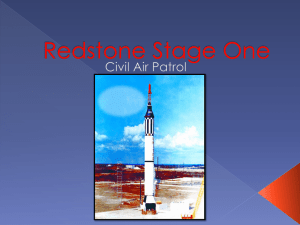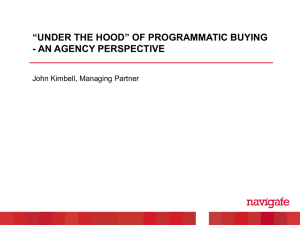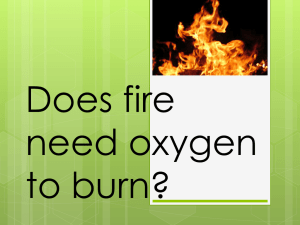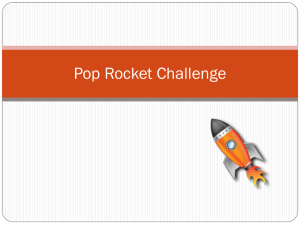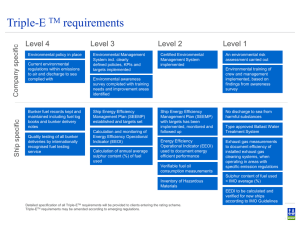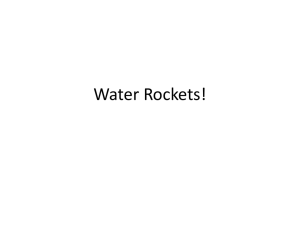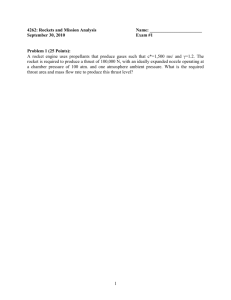Worksheet-ImpulseAndMomentum7.1
advertisement
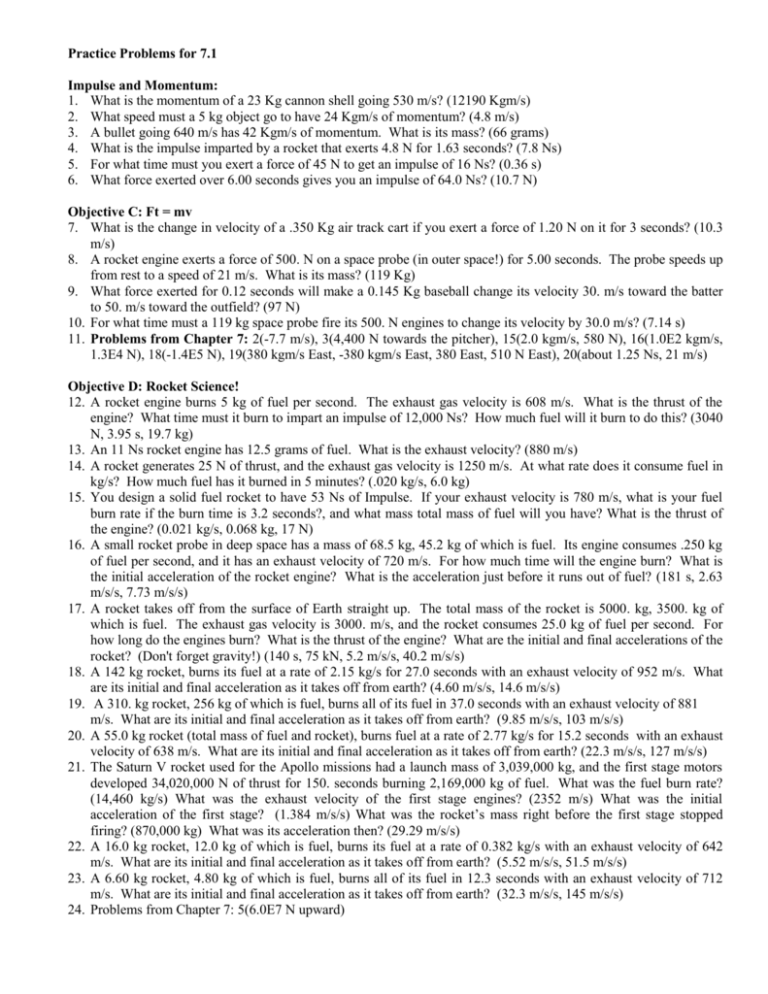
Practice Problems for 7.1 Impulse and Momentum: 1. What is the momentum of a 23 Kg cannon shell going 530 m/s? (12190 Kgm/s) 2. What speed must a 5 kg object go to have 24 Kgm/s of momentum? (4.8 m/s) 3. A bullet going 640 m/s has 42 Kgm/s of momentum. What is its mass? (66 grams) 4. What is the impulse imparted by a rocket that exerts 4.8 N for 1.63 seconds? (7.8 Ns) 5. For what time must you exert a force of 45 N to get an impulse of 16 Ns? (0.36 s) 6. What force exerted over 6.00 seconds gives you an impulse of 64.0 Ns? (10.7 N) Objective C: Ft = mv 7. What is the change in velocity of a .350 Kg air track cart if you exert a force of 1.20 N on it for 3 seconds? (10.3 m/s) 8. A rocket engine exerts a force of 500. N on a space probe (in outer space!) for 5.00 seconds. The probe speeds up from rest to a speed of 21 m/s. What is its mass? (119 Kg) 9. What force exerted for 0.12 seconds will make a 0.145 Kg baseball change its velocity 30. m/s toward the batter to 50. m/s toward the outfield? (97 N) 10. For what time must a 119 kg space probe fire its 500. N engines to change its velocity by 30.0 m/s? (7.14 s) 11. Problems from Chapter 7: 2(-7.7 m/s), 3(4,400 N towards the pitcher), 15(2.0 kgm/s, 580 N), 16(1.0E2 kgm/s, 1.3E4 N), 18(-1.4E5 N), 19(380 kgm/s East, -380 kgm/s East, 380 East, 510 N East), 20(about 1.25 Ns, 21 m/s) Objective D: Rocket Science! 12. A rocket engine burns 5 kg of fuel per second. The exhaust gas velocity is 608 m/s. What is the thrust of the engine? What time must it burn to impart an impulse of 12,000 Ns? How much fuel will it burn to do this? (3040 N, 3.95 s, 19.7 kg) 13. An 11 Ns rocket engine has 12.5 grams of fuel. What is the exhaust velocity? (880 m/s) 14. A rocket generates 25 N of thrust, and the exhaust gas velocity is 1250 m/s. At what rate does it consume fuel in kg/s? How much fuel has it burned in 5 minutes? (.020 kg/s, 6.0 kg) 15. You design a solid fuel rocket to have 53 Ns of Impulse. If your exhaust velocity is 780 m/s, what is your fuel burn rate if the burn time is 3.2 seconds?, and what mass total mass of fuel will you have? What is the thrust of the engine? (0.021 kg/s, 0.068 kg, 17 N) 16. A small rocket probe in deep space has a mass of 68.5 kg, 45.2 kg of which is fuel. Its engine consumes .250 kg of fuel per second, and it has an exhaust velocity of 720 m/s. For how much time will the engine burn? What is the initial acceleration of the rocket engine? What is the acceleration just before it runs out of fuel? (181 s, 2.63 m/s/s, 7.73 m/s/s) 17. A rocket takes off from the surface of Earth straight up. The total mass of the rocket is 5000. kg, 3500. kg of which is fuel. The exhaust gas velocity is 3000. m/s, and the rocket consumes 25.0 kg of fuel per second. For how long do the engines burn? What is the thrust of the engine? What are the initial and final accelerations of the rocket? (Don't forget gravity!) (140 s, 75 kN, 5.2 m/s/s, 40.2 m/s/s) 18. A 142 kg rocket, burns its fuel at a rate of 2.15 kg/s for 27.0 seconds with an exhaust velocity of 952 m/s. What are its initial and final acceleration as it takes off from earth? (4.60 m/s/s, 14.6 m/s/s) 19. A 310. kg rocket, 256 kg of which is fuel, burns all of its fuel in 37.0 seconds with an exhaust velocity of 881 m/s. What are its initial and final acceleration as it takes off from earth? (9.85 m/s/s, 103 m/s/s) 20. A 55.0 kg rocket (total mass of fuel and rocket), burns fuel at a rate of 2.77 kg/s for 15.2 seconds with an exhaust velocity of 638 m/s. What are its initial and final acceleration as it takes off from earth? (22.3 m/s/s, 127 m/s/s) 21. The Saturn V rocket used for the Apollo missions had a launch mass of 3,039,000 kg, and the first stage motors developed 34,020,000 N of thrust for 150. seconds burning 2,169,000 kg of fuel. What was the fuel burn rate? (14,460 kg/s) What was the exhaust velocity of the first stage engines? (2352 m/s) What was the initial acceleration of the first stage? (1.384 m/s/s) What was the rocket’s mass right before the first stage stopped firing? (870,000 kg) What was its acceleration then? (29.29 m/s/s) 22. A 16.0 kg rocket, 12.0 kg of which is fuel, burns its fuel at a rate of 0.382 kg/s with an exhaust velocity of 642 m/s. What are its initial and final acceleration as it takes off from earth? (5.52 m/s/s, 51.5 m/s/s) 23. A 6.60 kg rocket, 4.80 kg of which is fuel, burns all of its fuel in 12.3 seconds with an exhaust velocity of 712 m/s. What are its initial and final acceleration as it takes off from earth? (32.3 m/s/s, 145 m/s/s) 24. Problems from Chapter 7: 5(6.0E7 N upward)
